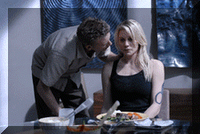 Source: Newsweek
Source: NewsweekThe third season of the Sci Fi Channel's smash hit 'Battlestar Galactica' starts Friday. Rabid fans will notice story lines ripped from the war against terror.
Oct. 4, 2006 - It's a regular affectation of television critics to declare this or that show - "Lost," "The Wire," "House" - the "best show on television." I am not a television critic, nor can I claim to have watched nearly enough TV to back up such a blanket assertion. But let me just say that "Battlestar Galactica," which starts its third season this week on the Sci Fi Channel (premiering Friday night at 10 p.m. ET), is indisputably, hands-down and without question, the best show on television.
About a year ago, I tried to pitch NEWSWEEK's arts editor on a "BSG" story. He said something along the lines of "Get out of my office, nerd," which neatly sums up the challenge of getting other people to watch it. The title unfortunately evokes its predecessor, a 1978 "Star Wars" clone that presented humanity fleeing through space, pursued by robots with the same blinking red LEDs that was later adopted by the talking car in "Knight Rider."
I was never a big fan of the original, but I became an instant convert to the Sci Fi Channel version, with its powerful introductory mini-series in 2003. The story was essentially the same as the 25-year-old "Battlestar:" humanity is living in idyllic peace on 12 planets when its two-legged Roombas, the Cylons, run amok and instigate intergalactic war. But in the new version, Starbuck, the hotshot pilot, is a woman; there's no sympathetic 10-year-old boy or gentle canine robot this time around, and Edward James Olmos (of "Miami Vice" fame) shines as the imperturbable Cmdr. William Adama. After a few hours, you even stop expecting Olmos to blurt out his memorable line from "Blade Runner": "It's a shame she won't live, but then again, who does?"
Back in college, I faithfully tuned each week to "Star Trek: The Next Generation." The show seems dated now, mainly because 40 minutes into each episode, the gears of plot resolution would predictably grind into motion. The more complex the story, the more desperate "Trek" writers became to resolve it, and they regularly resorted to techno mumbo-jumbo solutions that were so awkward they made viewers blush.
"Battlestar Galactica" - and in fact much of TV these days - exhibits no such interest in artificially resolving loose ends. Stories take place over the course of seasons, not single hours, and the series often feels like one long, grinding chase scene. Our heroes flee, suffering mounting casualties, fraying morale, existential nihilism and decaying societal bonds. Unbeknownst to our protagonists, the traitorous human scientist Gaius Balthar (James Callils ) keeps pulling humanity deeper into its enemies grip; and we are told at the start of each hour that the Cylons, some of whom appear human and are led by the seemingly conflicted Number Six (Tricia Helfer) have a plan - though we have yet to understand exactly what it is.
The show's creator, former "Star Trek" scribe Ron Moore, has a plan himself. It involves biting, topical commentary about the war in Iraq and the nature of insurgency, compromise and conflict. In the new episodes, our heroes are marooned in a Baghdad-like tent city on a desert planet, governed by the Cylons and their human collaborators. With the possibility of rescue by Adama remote, the protagonists resort to terrorist tactics: roadside bombs and suicide missions. It's a subversive story conceit: the heroes of "Battlestar Galactica" are the very terrorists we are now at war against.
At the center of the maelstrom is the ethically challenged Colonel Tigh, the show's biggest hawk and best character. In his portrayal of the squinting Tigh, actor Michael Hogan brilliantly channels Donald Rumsfeld. Tigh despises all things soft, and anything that smells of compromise or weakness. When he's told in this week's episode that a suicide bomber will inflict many casualties, both human and Cylon, he barks: "Don't avoid them. Send a message. There are no boundaries for the Cylons and there are no boundaries for us!"
Beyond the Rumsfeldian Tigh, the show blatantly co-opts the visual imagery of the current conflicts in the Middle East. Prisoners are marched into jails with hoods draped over their heads and sit alone in cement block cells - shades of Abu Ghraib. Human collaborators, serving as the occupied city's police force, wear black masks to conceal their identities, because their jobs are so unpopular that they would surely be killed if their identities were discovered. And at the end of this season's first episode, the Cylons attempt a mass execution by firing squad in front of big, earthen pit.
The fourth episode of the season will probably draw controversy. Without giving too much away, I'll only say that Tigh leads a small group attempting revenge against their collaborating compatriots. Without trial or judges, they mete out a dark and cruel brand of justice. At one point in the new episodes, when his tactics are questioned, Tigh bellows, "Take your piety and moralizing and your high-minded principles and stick 'em somewhere safe!"
Tigh is the kind of a warrior in charge of fighting America's battles today. One of the defining issues of the war - our real one - is: to what extent should a just and civilized society hold back against a merciless enemy? It's an urgent question, and "Battlestar Galactica" raises it regularly, honestly and entertainingly. You don't need to be a nerd to watch it. But of course it helps.
No comments:
Post a Comment